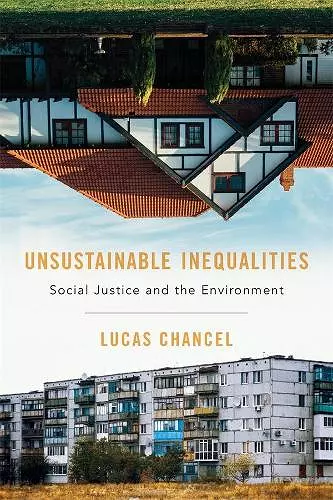Unsustainable Inequalities
Social Justice and the Environment
Lucas Chancel author Malcolm DeBevoise translator
Format:Hardback
Publisher:Harvard University Press
Published:30th Oct '20
Should be back in stock very soon

A Financial Times Best Book of the Year
A hardheaded book that confronts and outlines possible solutions to a seemingly intractable problem: that helping the poor often hurts the environment, and vice versa.
Can we fight poverty and inequality while protecting the environment? The challenges are obvious. To rise out of poverty is to consume more resources, almost by definition. And many measures to combat pollution lead to job losses and higher prices that mainly hurt the poor. In Unsustainable Inequalities, economist Lucas Chancel confronts these difficulties head-on, arguing that the goals of social justice and a greener world can be compatible, but that progress requires substantial changes in public policy.
Chancel begins by reviewing the problems. Human actions have put the natural world under unprecedented pressure. The poor are least to blame but suffer the most—forced to live with pollutants that the polluters themselves pay to avoid. But Chancel shows that policy pioneers worldwide are charting a way forward. Building on their success, governments and other large-scale organizations must start by doing much more simply to measure and map environmental inequalities. We need to break down the walls between traditional social policy and environmental protection—making sure, for example, that the poor benefit most from carbon taxes. And we need much better coordination between the center, where policies are set, and local authorities on the front lines of deprivation and contamination.
A rare work that combines the quantitative skills of an economist with the argumentative rigor of a philosopher, Unsustainable Inequalities shows that there is still hope for solving even seemingly intractable social problems.
Rising inequality and global warming are the most pressing issues of our time. Written by one of world's leading experts on global inequality trends and sustainable development, this book demonstrates that they can and should be addressed together, and offers refreshing perspectives on how to do so. A must-read. -- Thomas Piketty, author of Capital and Ideology
In this concise and precise book Chancel offers an indispensable metric to reveal the class conflicts that cut across the simplistic divide between ecology and social justice, reconciling those afraid of the ‘end of the world’ and those trying to ‘make ends meet.’ -- Bruno Latour, author of Facing Gaia
[Chancel] analyses the links between environmental and economic inequality. His conclusion is that we cannot solve one without addressing the other. An original perspective on two of our most significant contemporary challenges. -- Martin Wolf * Financial Times *
Well-structured, fluent, and sharp, Unsustainable Inequalities is a work of global relevance and paramount importance, even more so as inequalities as we have them make it impossible to confront the worsening climate crisis. -- Claude Henry, Sciences Po, Paris
Sobering but essential…[Chancel] identifies social inequality as a core driver of environmental unsustainability that leads to a vicious circle wherein the rich consume more and the poor lose access to environmental resources and become increasingly vulnerable to environmental shocks. -- Gillian Bowser * Science *
This book has unpacked the intricate relationship between social injustice and environmental harm and argues for delinking the complex nexus they form with economic inequality…A highly relevant and thought-provoking read during the COVID-19 pandemic when millions are affected socially and economically by lockdowns and restrictions. -- Gayathri D. Naik * LSE Review of Books *
Lucas Chancel reflects on the complex articulation of the environmental and the socioeconomic spheres… [The book] opens up avenues toward a more desirable and livable future. * Le Monde *
[Chancel] relentlessly sheds light on the failure of liberal policies. * Politis *
ISBN: 9780674984653
Dimensions: unknown
Weight: unknown
184 pages